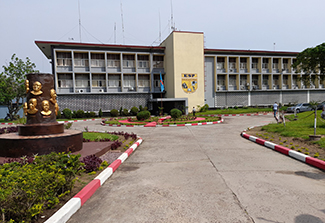Collaborating to fortify Kinshasa University’s research ethics system
March/April 2024 | Volume 23 Number 2
By Susan Scutti
 Photo courtesy of Kinshasa University School of Public HealthThe School of Public Health building at Kinshasa University
Photo courtesy of Kinshasa University School of Public HealthThe School of Public Health building at Kinshasa University
“When I started in global health, we used to search for networks or universities with major research grants in Africa, and now it's very commonplace,” said Dr. Adnan Hyder, who’s been conducting research in sub-Saharan Africa (SSA) for more than 25 years. Today, almost every country has “something going on, so it’s clear the volume of clinical and public health research being done in SSA has really gone up.”
World RePORT, an online database of global research investments, supports this perception: the National Institutes of Health funded 1,881 SSA grants in 2016 compared to 3,662 in 2022, while European funder Wellcome Trust supported 110 grants in 2016 compared to 503 in 2022.
This is an advantageous situation, yet difficulties remain. “We found, based on our work in country after country, that, even when clinical trials were being done, one aspect of the research support system—the research ethics system—was very challenging,” said Hyder, a George Washington University (GWU) professor of global health.
Dr. Paul Ndebele, a GWU senior research regulatory specialist, identified another stumbling block: “When you look at research ethics committees across Africa, there is a lack of standardization.” Add to that, researchers working in the Democratic Republic of Congo (DRC) complained about operational inefficiencies, with months of delays occurring before the research ethics committees would make decisions on applications. Comments received by investigators during reviews also show a need for training and tools to improve how appraisals are done, said Ndebele.
As research proliferates across SSA—and the DRC, in particular—research ethics systems need continuous reinforcement. “This has been a pain point for Kinshasa University (KU) for years,” said Hyder. “So, when we found Fogarty’s G-11 mechanism, we thought, ‘Maybe this is what we need to fill this gap.’”
Systems approach
Hyder and Ndebele collaborated with Dr. Paul Lusamba, a professor at Kinshasa University’s School of Public Health (KUSPH), on the proposal, “Strengthening Ethical Review Capacity in DRC.” Their G-11 project, which covered the period from May 2020 through December 2023, primarily aimed to fortify the ethical knowledge and skills of the KUSPH institutional review board (IRB) and improving its efficiency and performance.
Though early progress was impeded by COVID-19 disruptions, the team quickly adapted and made headway using a systems approach. They began with a needs assessment, using a tool developed through a previous Fogarty-funded initiative conducted by Hyder and colleagues. They evaluated the knowledge and skills of research ethics committee members and staff. Next, the team looked at review processes to find pain points. After this, they showed the KUSPH-IRB good examples of efficient systems and then asked,
Which systems (or parts of a system) are useful for your context? Hyder explained, “We never impose ideas from outside. It is incredibly important for local professionals, faculty, and staff to determine what is, and isn’t, useful for them.”
While Hyder drove strategy, Ndebele addressed the details, overseeing coursework provided by GWU’s summer institute, various ethics seminars, and several trainee webinars. Additionally, he arranged workshops conducted by GWU educators in Kinshasa and managed technical support. Pulling out all the stops, the team leveraged previous and ongoing ethics capacity building efforts supported by Fogarty to strengthen their influence. Dr. Imran Bari, a GWU senior research associate, who works with the team on a bioethics program in Mali, helped build relationships in the DRC—an intentional dovetailing of two francophone countries, Hyder explained. “We have to use all of our experience. We are currently in Mali, Zambia and Pakistan.”
Useful tools
On the brink of submitting their final project report, Ndebele noted that KUSPH-IRB’s standard operating procedures have been improved using checklists. Meanwhile, standard disclosure forms and other tools have helped resolve conflicts of interest. Ndebele also provided templates so the IRB can develop management plans and strategies to mitigate any impacts caused by conflicts of interest. Bari noted, “When the project started, KU was hiring new IRB committee members and research committee members. We asked them to aim for greater gender diversity; now, almost a third are female.”
“Our program was well-structured and basically addressed needs on the ground,” said Ndebele, who believes DRC researchers have more confidence now that the IRB has been strengthened. Though an HIV perspective guided this work, improvements to the research system will benefit all KU investigators, since they all pass through the same IRB. “We're also looking into strengthening how they deal with social and behavioral research,” said Ndebele.
Hyder said, “It was clear to us that if we could help local colleagues solve some of this inefficiency, we would help improve the entire research system. In a qualitative, anecdotal manner, we believe that’s what happened.” Since Kinshasa University is a leader in the DRC, this progress will benefit the entire country. Noting the grant’s modest budget, Hyder said, “The quantum of resources is tiny, so there's a limit to what you can do, and time will tell whether all the advancements can be sustained.” Both Bari and Ndebele worry that some changes might be lost without additional funding. Hyder concluded, “The sustainability, energy, enthusiasm of local partners—the local institution—has got to be ultimately responsible for this. The drivers must come from them.”
More Information
Updated April 16, 2024
To view Adobe PDF files,
download current, free accessible plug-ins from Adobe's website.
Related Fogarty Programs
Related World Regions / Countries
Related Global Health Research Topics